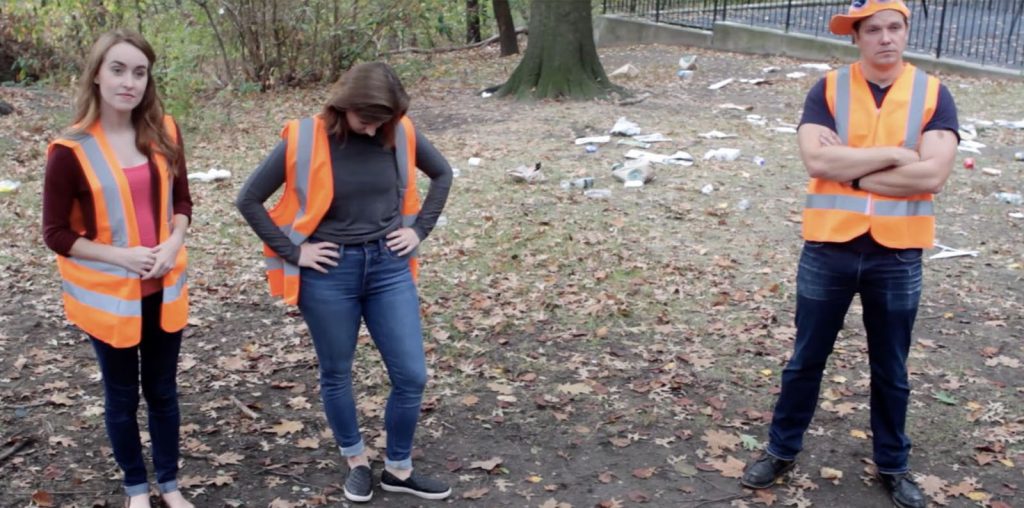
Gather up some filmmakers whose works have been barbecued by the critics and you will inevitably hear grumblings on how the critics should try to make their own films. Every now and then, a rare critic decides to leave the screening room in favor of creating movies. Francois Truffaut, Jean-Pierre Limosin and Rod Lurie come to mind as ex-critics who turned cinematic (and, of course, Roger Ebert’s screenplay for the lamentable “Beyond the Valley of the Dolls” is frequently cited as an example of how critics fall on their face when they are challenged to create a movie).
Mark L. Feinsod is the latest defector from the ranks of film journalism to the world of filmmaking. One of the founding editor/reviewers for the IndieWire online news service in 1995, Feinsod left journalism in 1997 to help organize the 1997 Independent Feature Film Market in New York before moving to London to begin a career as a filmmaker. Two experimental 16mm short films followed: the five-minute “Love and Lung Cancer” and the two-minute “Brno Train Death Friend” (the latter included a song donated by the techno artist Moby).
Feinsod returned to New York, upgraded his production focus to 35mm, and created the half-hour drama “A Sense of Entitlement.” An acid commentary on the consequences of free-wheeling spending, the film follows two lower Manhattan step-sisters (the artist Jessica and the druggie ex-model Caroline, respectively played by newcomers Nicole Severine and Rike Scholle) who find an abrupt shift in their lives when their rich father’s fortune evaporates. Winner of the Best Short Film Award at the 2001 Filmjunkie Underground Film Festival in San Francisco, “A Sense of Entitlement” will be the rare short film which steps out of the festival circuit for a theatrical run in late August at the Two Boots Den of Cin in New York.
Film Threat recently caught up with the 29-year-old Feinsod at his New York office, where is in pre-production on an hour-long mixed format work called “The Last Time I Saw Manhattan,” which is slated to begin production this fall.
You’ve reviewed films and you’ve created them. Which offers the greater challenge? ^ Definitely making them. To come up with ideas for the visual scheme and everything that entails, the actors, the editing, and so on-it’s far harder, but in a good way. And that’s only the creative side. Putting together a production, dealing with other people, being treated badly because I’m low on the radar…. its the best and the worst at the exact same time. Writing a relevant and insightful review is an extremely artful skill that I have a lot of respect for, but it doesn’t really compare.
Why did you decide to give up journalism for filmmaking? ^ I wasn’t a particularly good reviewer, but I’m glad that I had the opportunity to do it because it allowed me to see a lot of films for free. As I continued to write about film and learn about the industry, I realized that I didn’t have any passion for journalism or the business side of things. I’d go to see press screenings for anything-old, new, foreign, American, feature, short. I became captivated by a lot of films and I’d analyze why a certain thing had been depicted in the way that it had. I took that with me when I started to make stuff, in that there’s an aspect to my filmmaking that is about other films that I love. What’s great about film journalism is that you’re paid to immerse yourself in the film world. What’s bad about it is that you’re very peripheral to what’s actually going on.
Now that you’re outside of the reviewing orbit, how would you characterize the contemporary state of film criticism? In particular, what’s your view of online film criticism? ^ The problem with criticism is like the difficulty of analyzing history. It’s hard to get a handle on milestone events until years after they happen. It’s the same with films. The most immediate opinion is not necessarily the most valuable. I like to read articles where a writer will re-visit a film that’s been out for a while. That excellent series in Film Comment on Bresson a year or two ago comes to mind. They do a lot of articles of that nature which I enjoy. I also think Film Quarterly is quite good. ^ As for online film criticism, I don’t know much about it although the Australian site Senses of Cinema is excellent. When I’m surfing the Internet, which is not often, I tend to read gossip columns and stuff like The Onion. I find PageSix.com and PopBitch.com, things like that, to be entertaining. Right now I’m primarily using the Web to research Italo Calvino for a film idea that I have, and I spent about half an hour watching old Liz Phair videos online last night.
You were involved in organizing the 1997 Independent Feature Film Market in New York. Can you describe the planning, frustrations, surprises and logistics in coordinating this major industry event? ^ My most vivid memories are of working massive amounts of overtime and not getting paid for any of it, and then getting docked three days’ salary when I was out sick with a sinus infection. Also when I was told that I’d be fired if I didn’t stop writing a weekly column that I was doing for a publication at the time. That whole place felt like something that Upton Sinclair should’ve exposed.
Get the complete interview and read part two of MARK L. FEINSOD: BEYOND CRITICISM>>>.
